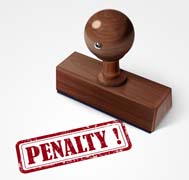
Tax Debt: Are You Self-Employed but Haven’t Filed Yet?
 We are well into July now and that means, if you are self-employed, your tax filing deadline has passed.
We are well into July now and that means, if you are self-employed, your tax filing deadline has passed.
If you filed on time, great, you’re set for another year. However, if you’ve yet to file, for whatever reason, you may be facing some serious penalties and a significant tax debt.
Many people don’t file because they know they will end up owing and can’t pay or don’t have proof to support various write-offs.
Often these individuals put off filing until the money to pay can be amassed (whether or not this is a realistic goal), while others choose to hold off in the hopes that the Canada Revenue Agency (CRA) will not be made aware of the transgression. Trust us, they will find out.
The CRA is often the most aggressive when it comes to trust monies and tax debt. So, if you’ve collected HST all year, but didn’t file by the deadline, and thus have not declared or submitted these trust monies, the CRA is going to come in search of those funds.
The CRA charges a late filing penalty of 5% of your balance owed plus an additional 1% for each month your return is late.
As long as your return was filed by the June 15th deadline, you don’t have to worry about these penalties. However, you still have to worry about interest.
Interest is charged on any unpaid balances at the established rates which are set by the CRA on a quarterly basis.
Although your tax return is due on June 15th, interest will start to accrue the day after the personal tax filing deadline (April 30th). That means, whenever you do decide to file, if you owe, those penalties will be applied retroactively.
Once the CRA is made aware of your debt, that’s when things can really start to get ugly. Although it is not illegal to owe a tax debt to the CRA, and thus prosecution is not a consequence, collection enforcement action is.
Garnishments of your income, a frozen bank account, even a tax lien may be in your future.
Our goal here is not to scare you.
If this is the situation within which you currently find yourself, you’re probably already concerned and are looking for tax debt consolidation. Our goal is to impress upon you the importance of dealing with tax debt as soon as possible.
Ignoring the problem will never make it disappear. It will actually just make things worse.
If you’ve held off filing your taxes because you know you won’t be able to make the necessary payments, we can help with tax debt relief. At DebtCare, we have years of experience helping Canadian self-employed individuals and small business owners tackle troublesome tax debts.
Get in touch with us today by calling 1 (888) 890-0888.


